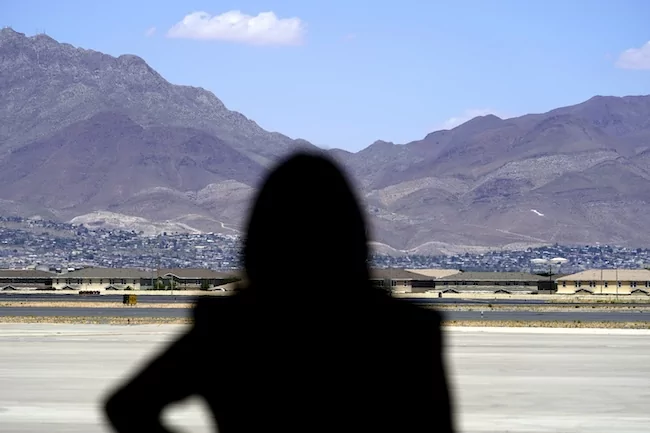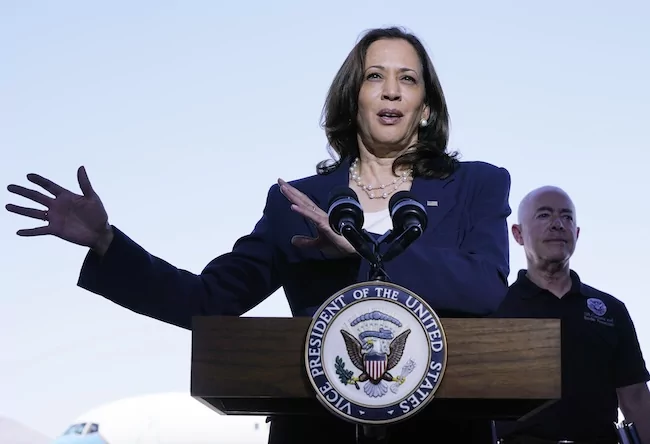
Vice President Kamala Harris sketched out in broad strokes how she would handle the border in a Thursday night address accepting the Democratic nomination for president in Chicago.
However, her pivot to the center on immigration, a departure from her 2020 views, has not quieted Republican criticism on what promises to be one of the most important topics of the 2024 race.
Harris reiterated this week that she would sign a bipartisan border bill the White House negotiated with the Senate earlier this year, suggesting she, like President Joe Biden, considers the millions in border crossings to be a liability in November.
But she also gave a nod to her Democratic base, coming out in favor of legal status for illegal immigrants.
“I know we can live up to our proud heritage as a nation of immigrants and reform our broken immigration system,” Harris said Thursday evening. “We can create an earned pathway to citizenship and secure our border.”
The position reflects the careful balancing act Harris is doing to win over voters. But it will not be enough to insulate her from criticism by Republicans, who have highlighted her past views, including her support for reforming Immigration and Customs Enforcement.
In one dig, Stephen Miller, the former Trump White House senior adviser, castigated the path to citizenship as being nothing less than “amnesty,” or the government’s forgiveness of immigration offenses.
“The one and only concrete policy Kamala Harris proposed tonight was to give amnesty and citizenship to every illegal alien in the country,” Miller wrote in a post to X.
Former Republican President Ronald Reagan famously gave millions of immigrants living in the country amnesty in 1986 in exchange for tighter border controls that did not fully come to fruition — setting up decades of Republican skepticism over talk of comprehensive immigration reform.
During Biden’s first month in office, the White House touted the U.S. Citizenship Act of 2021 as having the potential to overhaul decades of existing policy while creating an “earned roadmap” to citizenship for millions of people who are not U.S. citizens and have no way to earn that status.
The Biden administration failed to get it through Congress in 2021, however, and a later attempt to pass a separate bipartisan Senate border bill was tanked in 2023 after Trump urged House Republicans not to support it.
Sen. Elizabeth Warren (D-MA) said in a CNN interview in late July that she believed Harris would be the president to “get it done” in terms of a pathway for illegal immigrants.
Julie Chávez Rodríguez, Harris’s campaign chief, told CBS News last month that Harris wants to work on “real solutions” with the legislative branch.
“We know at the end of the day the only way to really modernize our immigration system and secure our border is for Congress to pass common-sense immigration legislation,” said Chávez Rodríguez.

Harris said as much during her acceptance speech, but she will be under additional pressure from frustrated progressives and immigrant rights groups to go far further than Biden promised as a candidate, including shutting down privately run federal immigration detention facilities.
“I refuse to play politics with our security, and here is my pledge to you,” Harris said Thursday. “As president, I will bring back the bipartisan border security bill that [Trump] killed, and I will sign it into law.”
Chad Wolf, the former acting secretary for the Department of Homeland Security, wrote in an op-ed Friday that Harris was not actually a centrist but had a radical plan in mind.
Wolf, now executive director and chairman of the Center for Homeland Security and Immigration at the America First Policy Institute, said the U.S. Citizenship Act would be the “most expansive and radical amnesty for illegal aliens ever introduced” and applicable to up to 15 million people.

Harris is expected to continue some of her boss’s existing border protocols.
Chávez Rodríguez said Harris would continue Biden’s June executive action that places a bar on the number of asylum seekers at the border. The White House has attributed the large decrease in migrant arrests to this action.
“I think at this point, you know, the policies that are, you know, having a real impact on ensuring that we have security and order at our border are policies that will continue,” Chávez Rodríguez said.
Immigration topped voter concerns in the Republican presidential primary earlier this year and continues to be a major issue in the general election. The number of border crossings has dropped precipitously in recent months, down from a record high in December, but the GOP still believes it can win the election by tying Harris to the spike.
Despite a basic framework for what a Harris administration would do on the problem, Republicans and conservatives were still frustrated by Harris’s lack of specificity, while still also concerned about the implications of what she did say.
CLICK HERE TO READ MORE FROM THE WASHINGTON EXAMINER
The Wall Street Journal editorial board called the speech “mostly devoid of policy substance,” while Republican presidential nominee Donald Trump said she skipped over entire topics.
“She didn’t talk about many things like interest rates, China, fracking, crime, poverty, trade deficits, child trafficking, woman trafficking, drugs, the border. She didn’t talk about the most important things,” Trump said in a phone interview with Fox News following her remarks. “I ask a simple question: Why didn’t she do it?”
— Trump War Room (@TrumpWarRoom) August 23, 2024






